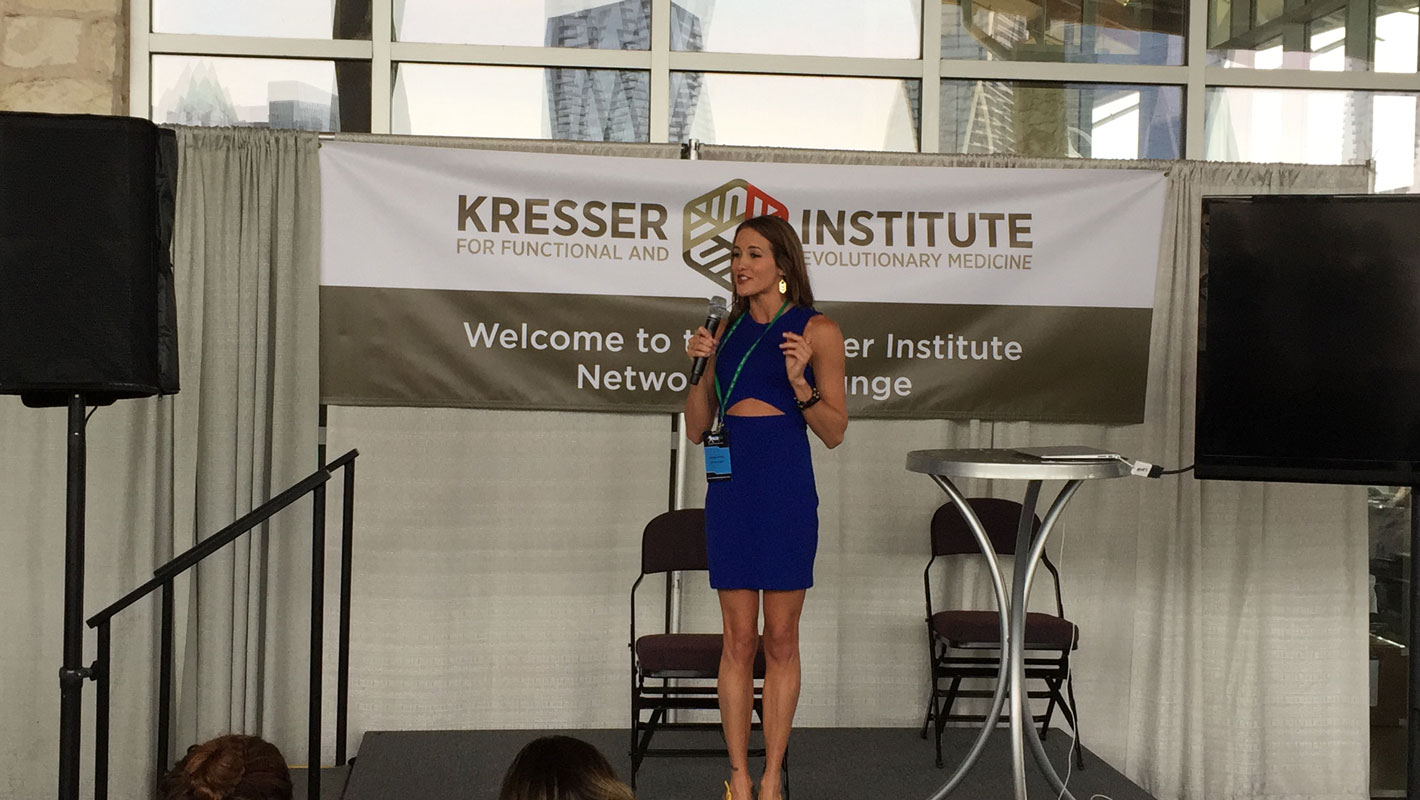On one of my first days working as a hospital dietitian, I had a patient come in with a feeding tube. A feeding tube is a device used to provide nutrition to people who cannot eat orally. This patient was receiving all of his nutrition through the tube, which means I could control every last calorie he was taking in. I knew without a doubt he wasn’t “cheating” with his eating because this was his only source of nutrition and sadly, he couldn’t eat orally even if he wanted to.
He was on an 800 calorie per day diet.
This was the day I first met him. Ironically, he had gained 10 pounds since the last time he’d seen a dietitian, just a few months prior. As I read through the notes the previous dietitian had documented, I noticed a trend happening: His calories were brought down from 1800 to 1500 to 1200 to 1000 to now currently 800…and you’ll never guess what was happening. An inverse relationship!
As his calories were reduced, his weight went UP!
But, why??? Thankfully, I wasn’t stumped for long. I realized that it was due to a lot of the non-caloric, non-food factors that I outline on this blog and in the chapters of Why Am I Still Fat? The Hidden Keys to Unlocking That Stubborn Weight Loss.
The reality is that weight loss is not just about calories.
I know you’ve been told over and over to count your calories and make sure you’re burning more than you’re taking in. If you’re not, then you won’t lose weight. If you are, and you’re still not losing weight, then you’re too indulgent, don’t have enough willpower, or there’s something wrong with you. UGH!
Of course, this advice is shameful, heart-breaking and flat out false. There are several more factors that play a role in how your metabolism functions and whether you’re losing or gaining weight—beyond “calories in and calories out.” True weight loss that stays off is never about deprivation.
If it were all about calories, my patient would have, without a doubt, been losing weight as his daily calorie intake decreased. That’s how it was supposed to work anyway…right? Well, that’s what we’ve been taught, but that’s also not the case.
Time and time again, clients come to our weight loss coaching program who have been counting calories to a “T”, yet, like my patient on the feeding tube, the weight doesn’t budge. They even sometimes gain weight in the process. Or they lose weight and then gain it all back when they finally eat again (because we can’t starve ourselves forever!). Maybe this is starting to sound a little too familiar to you. Let me explain why this happens.
Your body is extremely complex. Trying to oversimplify by tracking a single substance, like a calorie, is ineffective and frankly, degrading. Counting calories leaves you feeling deprived, dissatisfied, hungry and eventually, right back where you started (or worse). Not only do you feel lethargic and empty as you restrict your body of what it needs (energy in the form of calories), but any weight you do lose ends up coming back anyway once you start eating again. It’s a lose-lose situation. Not only do you not attain the desired result, but you also feel awful in the process and horrible about yourself!
To make matters worse, you end up slowing down your metabolism—actually damaging it, which makes your next attempt at shedding pounds even more difficult. Calorie counting sets you up for yo-yo weight loss and gain for years to come. It’s a battle you are destined to lose.
What’s a calorie?
Okay, let’s back up: by definition, a calorie is the energy it takes to raise the temperature of one gram of water by one degree Celsius. The important takeaway from this definition is the word energy. Calories are energy that fuel our bodies and help them run; just like gasoline fuels our cars. You wouldn’t expect your car to run better if you take away the gas, so why would you expect your body to work better when you deprive it of calories?
This is exactly why restricting calories for fat loss doesn’t make any sense! When you deprive your body of the energy it needs, it fights back and actually conserves its own energy by slowing down your metabolism.
That’s why when you follow a diet, you feel tired, irritable, hungry, have outrageous cravings, frequent headaches, and low energy levels. The opposite is true as well: when you fuel your body with what it needs, it works for you; you are satisfied and you lose weight.
When you think of calories, think of energy.
Eat fewer calories and your body burns fewer calories. Eat more and your body burns more. The more you fuel the fire, the more it burns. When it burns, you feel energetic, you can think clearly, and if other factors (like hormones, gut health, and thyroid function) are in balance and up to par, you’ll be able to effortlessly shed pounds.
This is the opposite of dieting where you feel lethargic, have a foggy brain, and your body fights against you by conserving energy instead of burning it. That’s why nearly all calorie counters gain the weight back after they lose it.
All in all: “Calories in and calories out” is a fundamentally flawed view. One obvious reason is that this theory treats all calories equally, regardless of source, and calories are not created equal. Your body does not metabolize and process all calories in the same way.
For instance, some calories consist of chemicals your body doesn’t recognize. With the calorie-counting concept, diet soda is equivalent to WATER. Does that make sense? No way! Your body doesn’t treat diet soda the same way it treats water! Research repeatedly shows that artificial sweeteners can cause weight gain; they hinder your metabolism since your body doesn’t recognize them.
When it comes to weight loss, if calories don’t count much then what does?
Lasting weight loss doesn’t happen with a cookie cutter, calorie counting approach. I found that in order for it to be successful—and for good—programs need to be individualized. There are a number of factors that differentiate from person to person, and so many critical components are completely overlooked when we focus on calories alone. Hormones, thyroid, gut health, lab data, activity level, stress levels, sleep quality…and more.
Working through each of these overlooked, never-talked-about elements is just what my dietitian coaches and I do with our clients in our one-on-one coaching program.
What can you do?
Well, you can keep doing what you’re doing and get the results you’re getting (that’s the definition of the word “insanity”…no thanks!).
Or…you can take these 3 steps:
1. Stop counting calories.
Stop it. Right now. Remember: Calories are energy. Energy that fuels your body. Energy that helps your metabolism work.
The trick is—you have to make sure the calories you’re bringing in (but not counting! ;)) are from the right types of food. Speaking of which…
2. Eat your P’s, F’s and C’s.
There are three “macronutrient” categories that every food falls into: protein, fat, and carbohydrate.
One of the best ways to support your metabolism (and, by extension, your waistline) is to consume all three—proteins, fats and carbohydrates—together, in balance.
“PFC Every Three” (short for Protein, Fat, and Carbohydrates) is the term I coined referring to eating a combination of the three macronutrients every few hours. More on that here.
3. If you’re ready to learn more about what REALLY counts when it comes to weight loss, grab my bestselling book!
Here’s what a few readers said:
“Cassie’s book is great, and I found it so easy to read and educational. I really like the way she explains how the macronutrients work together and the impact of unhealthy foods, hormone imbalance, stress and lack of sleep on my body. Understanding the “why” is a big part of change, I know. I appreciate your common sense approach to eating and I am working on implementing some changes.”
“Cassie isn’t here for some quick fix, fad diet. This is not another hopeless remedy. She really cares to help people and shows us that though our food system may be screwed up, it isn’t impossible. I have never felt so much freedom in my life than I have now! Cassie shows you HOW without deprivation or feeling overwhelmed, but also going deep and getting to the bottom of the cause—so much deeper than just food. This life-transforming message and truth needs to be in everyone’s hands!”
“I loved the book! I found the information easy to follow and relevant. There are so many useful tips, eating plans and information in Dietitian Cassie’s book for anyone to be successful with in developing a healthy eating lifestyle or to achieve weight loss. The book guides are wonderful as well and a huge bonus!!!!! Excellent read…I highly recommend it!!!!”











